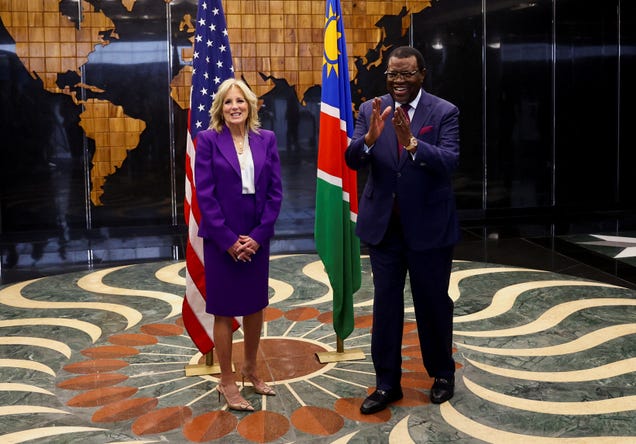US First Lady Jill Biden is currently in Namibia for a two-day visit. She landed in Windhoek—the capital—on Feb. 22, and will proceed to Kenya on Feb. 24. This is her sixth visit to Africa.
“Our world is connected—what happens oceans away, affects us all,” Biden tweeted. “We will honor our shared democratic values, and reaffirm our commitment to the futures of Namibia and Kenya.”
Why she visited Namibia first
Biden said Namibia’s growing multi-party democracy motivated her visit. The US has previously hailed Namibia’s democratic power transitions, including during former president Donald Trump’s reign.
Sitting in both the Kalahari and Namib deserts, the south-western African country is home to 2.6 million people who, unlike in most other countries in the continent, enjoy peaceful elections, press freedom, and higher gender equality. However, the ruling party follows a similar script as the rest of Africa—struggling to root out corruption and abuse of power.
On Feb. 22, she visited and laid a wreath at the Heroes’ Acre, a memorial to those who fought for the nation’s independence.
During her visit to Namibia, her efforts were expected to focus on the role of the youth in advancing the country’s democracy.
Hunger in the Horn of Africa region
The Horn of Africa region is currently battling its worst drought in four decadesheightened by climate change, weak agricultural systems, years of conflict and instability, the covid-19 pandemic, the war in Ukraine, and inflation.
For her visit to Kenya, Jill Biden is expected to assess the dire food insecurity situation that currently is currently affecting 4 million Kenyans, 7 million Somali people, and 20 million Ethiopians.
She will also be engaging on discussions around empowerment of women and youth, measures to curb gender-based violence, and protection of children’s rights.
“In Kenya, Biden will very specifically draw attention to the food security crisis impacting the Horn of Africa, which is noted as the worst drought that this region has experienced in decades,” press assistant Becky Farmer told the VOA.
During the US-Africa Leaders Summit in Washington DC last December, president Biden announced an additional $2.5 billion for emergency humanitarian aid for the African continent, in addition to the $11 billion in food security aid that he had earlier announced.
This, coupled with American philanthropist Bill Gates’s $7 billion announcement for funding health and agriculture last November, add to Biden’s plans to catch up with China and the EU in bilateral ties with Africa after isolation by the Trump administration.










